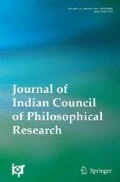Abstract
This paper is an attempt to see the similarity between the Shankara’s notion of Ätman and Husserl’s Transcendental Ego. Both thinkers, Husserl and Shankara trace true knowledge to the transcendental self. The former describes the self as the embodiment of absolute knowledge that transcends the limitations of the body, the senses and the intellect. In the state of bondage and ignorance, this Transcendental Ego is oblivious of its ontological and cognitive priority or transcendence and seeks knowledge in the natural world of relative truths. It forgets that this world is merely an appearance (vivarta) rooted in the Ᾱtman which is identical with Brahman
Similar content being viewed by others
Notes
David Hume, A Treatise on Human Nature, ed L.A. Selby-Bigge (Oxford: Claredon Press, 1960), p. 253.
Rene Descartes, Meditations on First Philosophy, trans. Laurence J. Lafleur (Indianapolis: The Bobbs-Merrill Company, Inc. 1960), p. 24.
Shankara’s Bhāṣya on the Brahma-Sūtras, ii. 3.7.
Edmund Husserl, Cartesian Meditations. An Introduction to Phenomenology, trans. Dorian Cairns, (The Hague: Martinus Nijhoff, 1960), p. 66.
Edmund Husserl, Ideas, trans. By W.R.B. Gibson (New York: Collier-Macmillan, 1962), p. 214, 8:80.
Edmund Husserl, Cartesian Meditations, p. 18.
Edmund Husserl, Cartesian Meditations, p. 21.
A.K. Chatterjee & R.R. Dravid, The Concept of Sākṣī in Advaita Vedānta (Varanasi: B.H.U., 1979), p. 80.
A.K. Chatterjee & R.R. Dravid, The Concept of Sākṣī in Advaita Vedānta, pp. 80–81.
Dr. S. Radhakrishnan, Indian Philosophy Vol. II (Bombay: Blackie & Son, 1983), p. 601.
Shri Shankaracharya, Brahma-Sūtra-Bhāṣya, trans. by Swami Gambhirananda (Calcutta: Advaita Ashrama, 1993), p. 6 (I.i.1).
Shri Shankaracharya, Brahma-Sūtra-Bhāṣya, p. 455 (II.iii.7).
Edmund Husserl, Cartesian Meditations, p. 66.
Edmund Husserl, ‘Philosophy as a Rigorous Science,’ trans. Q. Lauer, in Phenomenology and the Crisis of Philosophy (New York: Harper & Row, 1965) p. 80.
Shankara’s Bhāṣya, on Brahma-Sūtra, i.I.4. Here, Shankara distinguishes the pure self or ‘Sākṣīn’ from the empirical self or ‘jīva.’
‘Phenomenology,’ Ency. Britannica, Vol. 14 (Chicago: Encyclopaedia Britannica Inc., 1984) p. 212.
J. Derrida, Le probleme de la genese dans la philosophie de Husserl (Paris: 1993) Quoted in ‘Of Intentional Consciousness’ by Arkadi Nedel, in Philosophy Today, Vol. 39, No. ¾, 1995, p. 298.
Shankara’s Bhāṣya, on the Brahma- Sūtra aphorism No.—ii.I.4.
Edmund Husserl, Ideas Pertaining to a Pure Phenomenology and to a Phenomenological Philosophy, First Book (The Hague: Martinus Nijhoff, 1988), Section 81, p. 194.
Edmund Husserl, Cartesian Meditations, p. 25.
Author information
Authors and Affiliations
Corresponding author
Additional information
Publisher's Note
Springer Nature remains neutral with regard to jurisdictional claims in published maps and institutional affiliations.
Rights and permissions
About this article
Cite this article
Singh, P.K. Some Observations on Shankara, Husserl and the Transcendental Ego. J. Indian Counc. Philos. Res. 37, 257–264 (2020). https://doi.org/10.1007/s40961-020-00200-y
Received:
Accepted:
Published:
Issue Date:
DOI: https://doi.org/10.1007/s40961-020-00200-y




